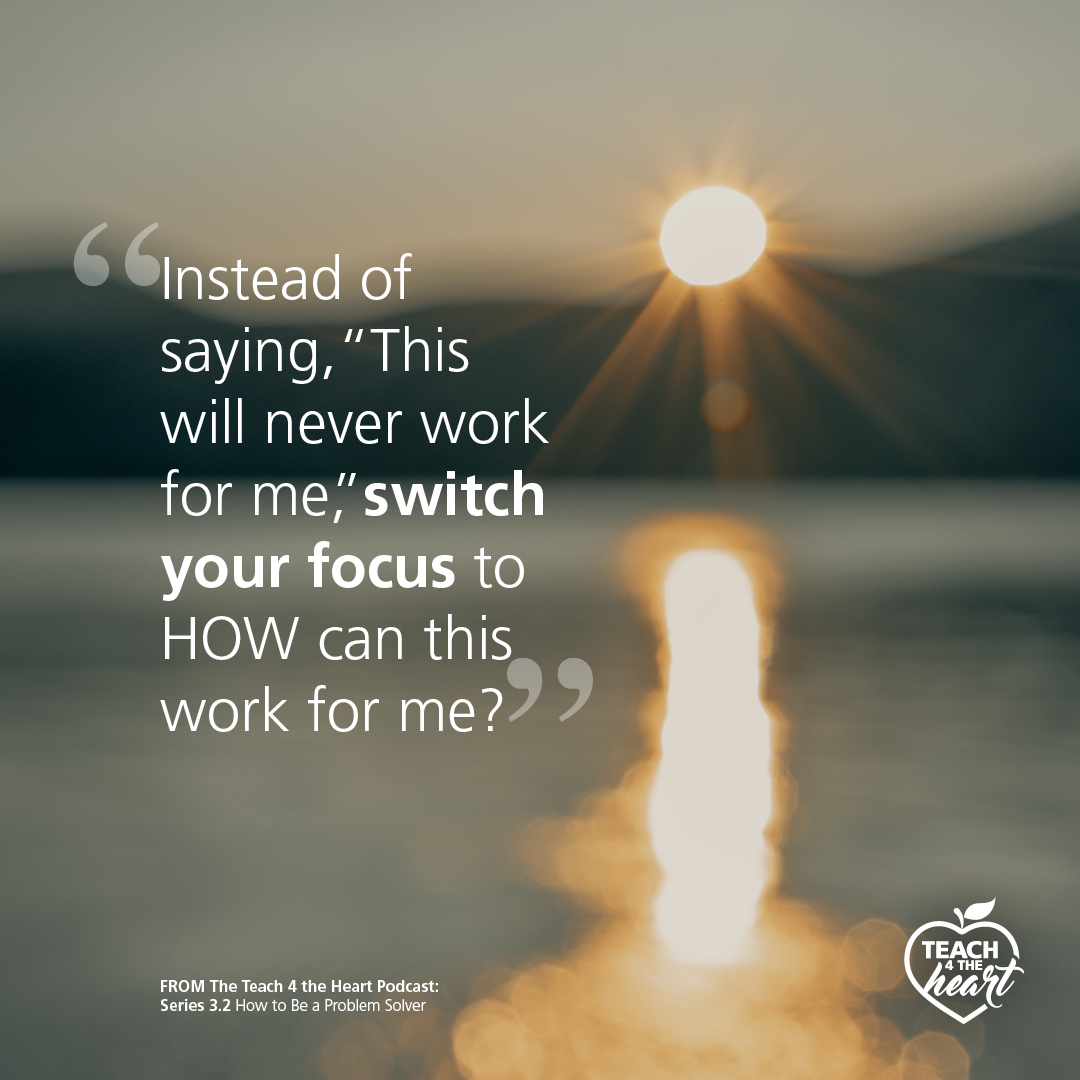Does teaching feel discouraging lately?
What do we do when the frustration and discouragement is so strong that we're not sure we can keep going much longer?
In this special two-week miniseries, we'll first explore how we can find resilience and encouragement in our faithful God. We'll then consider the practical side, seeking out wise solutions to solve the issues that we can.
So join us as we seek God and seek solutions to banish discouragement and maybe even get to the point where we love teaching again.
Banish Discouragement & Love Teaching Again
WHAT'S INCLUDED IN THIS SERIES:
#1: When You're Not Sure You Can Keep Teaching
from SERIES: Banish Discouragement & Love Teaching Again
February's always a challenging month for teachers - but for many of you, the frustration & discouragement goes even beyond that.
You may be seriously questioning if you should keep being a teacher or if you should look for another career. You might even be wondering if you can make it to May!
What do you do when you feel so discouraged? Pastor & author David Platt shares this advice (and much more) in this week's podcast:
1. Press into God:
Know you're not alone. He is with you and He's called you here. You couldn’t do life without Christ before these challenges, now that they’ve come, you need Him more than ever! Press into Christ's joy and His strength. You can’t do it without him.
2. Be in relationship with other educators:
Other Christian educators remind you you’re not alone. When tough issues come up and you’re not sure how to navigate them according to your faith, Christian educators can provide wisdom.
3. Know it’s not easy:
God has not called us to be comfortable, so what does faithfulness look like? It looks like walking into hard things. It looks like perseverance. God is better than being comfortable. He is better than anything in the world, so use these challenges to drive you closer to Jesus. He doesn’t promise it will be easy, but He DOES promise we can do all things through Him.
So what if you’ve considered the advice above and are not sure if you should continue teaching or not?
There are 3 things we should do when trying to discern the will of God in making that decision. To hear the three steps, listen to the full podcast episode above.
RESOURCES MENTIONED IN THIS EPISODE:
Banish Discouragement & Love Teaching Again
CHECK OUT THE FULL SERIES:
#2: How to Be a Problem Solver
from SERIES: Banish Discouragement & Love Teaching Again
If we want to improve our situation, we must be willing to seek out solutions.
In the second podcast episode of this series, we learn 3 key steps to seeking out solutions:
1. Identify the problem. (We need to know what problem we are solving!)
2. Pray about it. (God truly is the best problem solver. Truly.)
3. Seek out solutions.
Many times, God allows the wisdom of other people to guide us to answers. Yet, when people suggest solutions to us, it can be very difficult to accept their recommendations. Why?
Well, we assume they don't know how hard our situation is.
Sometimes we wish their suggestion was easier to implement.
Other times, we just don't like the advice we have received.
Here are two ways you can make the most of advice when it is given to you:
First: Allow yourself only one "Yeah, but."
How many times have you responded to advice with a "yeah, but..."?
Yeah, but my class is bigger than yours.
Yeah, but my admin does things differently.
Yeah but we don't use that curriculum.
Yeah, but that will not work in my situation...
Don't miss out on a workable solution by dismissing great advice with a "yeah, but..."
Second: Instead of saying, "This will never work for me," switch your focus to "HOW can this work for me?"
When people share their experiences, not everything will line up exactly. (That is where we often start to "Yeah, but...").
Instead of automatically dismissing the entire piece of advice, get creative and see if you can find a way to apply part of the idea to your problem.
Solutions are key to improving our situation. Our mindset about solutions and advice are pivotal too.
When we pray about our issues, we can expect the Lord to show up with help.
And when we have people willing to stand beside us and offer us advice and encouragement, it is our job to be thankful for them and then to find what's workable for us in the advice that was given.
For more ideas on seeking solutions in the classroom (and to learn how our new program Teach 4 the Heart + can help you with that!) listen to episode 2 of the podcast series Banish Discouragement & Love Teaching Again.
JOIN US IN TEACH4THEHEART+
Members receive unlimited access to our four most popular courses PLUS access to mentors, exclusive resources, and much more!
Banish Discouragement & Love Teaching Again
CHECK OUT THE FULL SERIES:
subscribe to the podcast
To be notified via email when the next Teach4theHeart podcast episode is released, [thrive_2step id='4859']sign up here.[/thrive_2step]
You can also subscribe to the Teach 4 the Heart podcast in Apple Podcasts, Spotify or your favorite podcast app.
spread the word!
Did you find this series helpful? Bless your fellow teachers by sharing this post directly (just copy the URL) or by clicking one of the buttons to automatically share on social media.
Pin it for later ⤵
This article may contain affiliate links. This means that if you purchase a resource after clicking the link, Teach 4 the Heart may receive a small commission at no extra cost to you. Thanks for helping support Teach 4 the Heart in this way.







